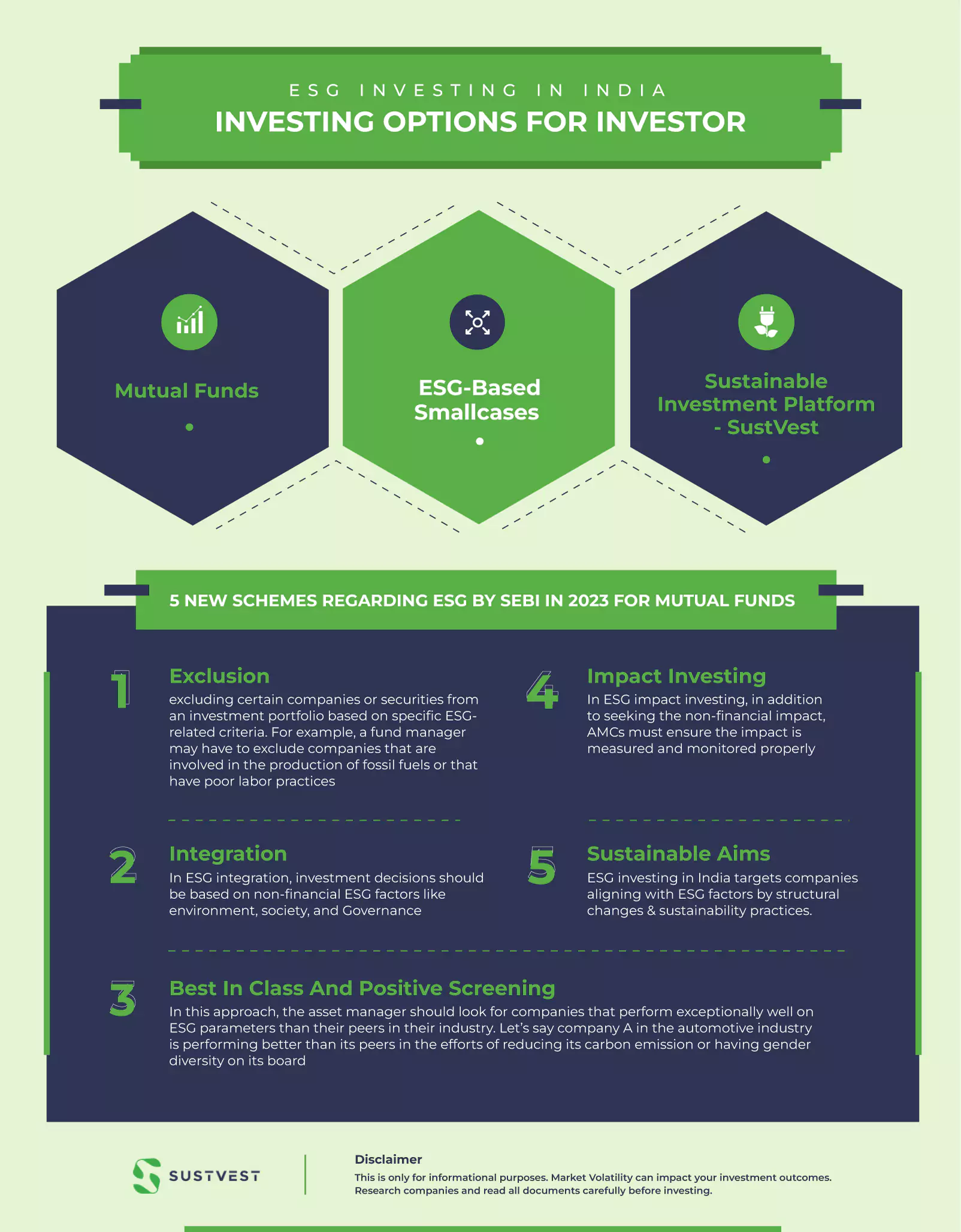ESG investing in India has become a noteworthy buzzword in the investment arena, capturing the attention of both new and seasoned investors. It has sparked discussions on how this approach will potentially reshape investment patterns and strategies.
Two of three millennial and Genz investors said that are concerned about climate change and social issues. However, almost 70% of Gen X and Baby Boomers (age 58 and above) said that they are not concerned about any other aspect than profit while investing.
Perhaps this is because they lived their lives and these future generations are yet to. We are not here to make assumptions. We are here to state the fact which is:
ESG assets across the world are predicted to grow to a staggering $50 trillion by 2025. Which accounts for around 33% of all AUM.
So before you miss this golden opportunity for ESG investment, let’s delve into this article and know everything you need to know about ESG investing in India, from definition and applicability status to framework by Authorities, as well as how and where to invest.

So, What ESG Investing in India Is All About?
The textbook definition of ESG is a set of non-profitable parameters that affect investment decisions when investing in companies.
“E” stands for environmental factors, such as carbon emissions, fossil fuel usage, water consumption, and pollution.
“S” stands for how the company is socially responsible for its actions towards employees, suppliers, and customers.
Lastly, “G” stands for corporate governance, which includes the company’s code of conduct and ethical practices in business.
Simply put, ESG is a subset of parameters that require companies to act in a sustainable manner and not just think about profits, but also take care of their surroundings
.ESG investing in India is relatively new, barely 5 years old. However, it is gaining attention and investments due to a shift in investors’ attitudes towards inclusiveness.
ESG comes under the umbrella of sustainable investing, knowing the key differences between impact investing, ESG, and SRI will further clarify the concept.
The Existing Framework Of ESG Investing In India
After making stunning returns in UK and USA investment markets, India had to jump on the bandwagon of ESG investing. Although only during the last five years, it gained a momentum
It is estimated by 2030, Investment in ESG may cross the 1 trillion mark for ESG investing in India. For now, it’s baby steps but SEBI and Indian Government are establishing the framework for ESG investment to boost transparency.
Post-COVID environmental awareness became a non-negotiable for the younger generation as means to invest, which prompted more than 5 mutual funds to appear in the ESG genre in the span of two years.
So yes, ESG investment is indeed applicable in India, and there are several options available for retail investors who are interested in investing in a sustainable and socially responsible manner.
ESG Investing In India: Investing Options For Investor
For ESG investing in India, your options include investing in mutual funds that focus on ESG factors, using small case portfolios that focus on sustainable investing, and even investing in innovative energy platforms like SustVest. Let’s discuss what is esg investing? and the list of esg funds available in india
Mutual Funds
As an Indian investor, you can choose to invest in mutual funds that follow an ESG investment strategy, such as the SBI Magnum Equity ESG Fund, the ICICI Prudential ESG Fund, or the Axis ESG Equity Fund there are six more ESG funds to choose from (link article no 32)based on the returns.
These mutual funds basically invest in companies that do exceptionally well in addressing ESG issues. Their effort in ESG ranges from reducing their carbon footprint to minimizing fossil fuel usage and doing ethical and fair practices across the community. You can expect from 1 to 10% of returns annually from these mutual funds. ESG investing in India by mutual funds is the simplest way to make sustainable investment choices.
ESG-Based Smallcases
The concept behind smallcases is investing in ideas, and as a result, it offers several ESG funds, such as ESG core and green portfolios. These portfolios invest in companies involved in sustainable agriculture, renewable energy, healthcare, technology, and electric vehicles.
Investing in ESG-based smallcases can provide exposure to socially responsible and sustainable companies that align with investors’ values.
It is important to highlight that ESG investing in India, specifically in smallcases, may demand significant investment from retail investors.
For instance, the Green portfolio may require an investment of around 70,000 INR. While the potential returns may surpass those of mutual funds, it is crucial to consider the management fees and associated costs involved in the process.
Sustainable Investment Platform- SustVest
Another way of starting ESG investing in India is through sustainable investment platforms like SustVest. It is a platform that connects investors with companies that have renewable energy projects. This provides investors with an opportunity to support and promote sustainable practices in India while also earning up to 15 % returns on their investments annually.
SustVest allows companies to list down their ESG projects, along with their financing requirements and expected returns. Investors can then browse through these projects, learn more about them, and choose to invest in the ones they find most promising.
These three are one of the best alternatives available to an Indian retail investor seeking to make a difference along with earning steady returns.

The Process of ESG Implementation in India: How ESG Investing in India Works?
This section provides an overview of how ESG investing works in India, which is then broken down into two perspectives: the framework for ESG reporting agencies and mutual funds.
As an investor, it’s important to have a good understanding of the framework to make informed decisions about investing. The section then delves into each subpoint to explore how they contribute to the ESG investing process in India.
Framework for ESG Schemes in Mutual Funds
Currently, each mutual fund house can launch only one ESG thematic scheme. However, to promote ESG investment in India, with this recent announcement, SEBI has made clear that asset management companies are allowed to launch one ESG scheme under each of the five sub-categories.
5 New Schemes Regarding ESG By SEBI in 2023 For Mutual Funds:
- Exclusion
excluding certain companies or securities from an investment portfolio based on specific ESG-related criteria. For example, a fund manager may have to exclude companies that are involved in the production of fossil fuels or that have poor labor practices.
- Integration
In ESG integration, investment decisions should be based on non-financial ESG factors like environment, society, and Governance. For instance, explicitly incorporating companies that have a sustainable and ethical take on issues like climate change, human rights, and fair governance practices.
- Best In Class And Positive Screening
In this approach, the asset manager should look for companies that perform exceptionally well on ESG parameters than their peers in their industry. Let’s say company A in the automotive industry is performing better than its peers in the efforts of reducing its carbon emission or having gender diversity on its board. Company A should be prioritized in this subcategory.
- Impact Investing
In ESG impact investing, in addition to seeking the non-financial impact, AMCs must ensure the impact is measured and monitored properly. For example, investing in a company that offers a renewable energy investment platform, not only generates financial returns but will also contribute to generating zero-emission energy, thus positively impacting the environment.
- Sustainable Aims
ESG investing in India targets companies aligning with ESG factors by structural changes & sustainability practices. For example, Including a company that generates clean energy be it an EV company or a solar company that has a futuristic approach to reduce fossil fuel usage.
In addition, SEBI has also proposed two requirements from AMCs to provide the name of the particular ESG strategy and the fund. Also, the asset managers also have to disclose the name of the ESG rating agency with ESG scores in monthly portfolio disclosure.
Guidelines and Framework for ESG Rating Provider(ERP)
SEBI implemented the Business Responsibility and Sustainability Reporting (BRSR) framework in 2012. It requires listed companies to disclose their ESG practices. In 2023, the top 1000 companies listed on the stock market based on their market capitalization are required to publish their BRSR report in the annual report.
To minimize the hazard of greenwashing at each of the above five scheme levels, SEBI wants ESG schemes to invest at least 65% of its asset under management in companies that are publishing their BRSR report comprehensively and are also offering assurance on BRSR core disclosure.
SEBI has issued these 9 KPIs for ESG rating providers with 150 listed companies in the stock market.
- Greenhouse gas emission
- Water consumption
- Environmental footprint
- Embracing circularity
- Employee health and wellness
- Representation of Gender Diversity
- inclusive development
- fairness in engaging with customers and suppliers.
FAQs: ESG Investing in India
What does ESG stand for?
ESG stands for Environmental, Social, and Governance. It is an investment approach that considers environmental, social, and governance factors when evaluating the performance and sustainability of a company or investment.
How is ESG investing practiced in India?
ESG investing in India is gaining traction, and several asset management companies have started offering ESG-focused funds and investment products. These funds incorporate ESG factors into their investment processes and allocate capital to companies that meet specific sustainability criteria.
Way Ahead
ESG investing has taken the world by storm, As a result, India’s demographic dividend has become more conscious of leaving a better society thriving on sustainability and inclusivity for future generations.
In the coming years, there will be even more options for ESG investing in India. Not only ESG, but sustainable, responsible, and impact investing will also grow. So as an investor, it’s essential to stay informed about regulations and frameworks and to invest in projects or portfolios that suit your risk appetite, initial investment amount, and expected returns.
SustVest, a leading platform for ESG investing in India, meets all three criteria of sustainable investment. By investing with SustVest, you not only have the opportunity to earn returns but also contribute to a greener and more equitable world. Join us at SustVest today and be part of the ESG investing movement in India.

Founder of Sustvest
Hardik completed his B.Tech from BITS Pilani. Keeping the current global scenario, the growth of renewable energy in mind, and people looking for investment opportunities in mind he founded SustVest ( formerly, Solar Grid X ) in 2018. This venture led him to achieve the ‘Emerging Fintech Talent of the Year in MENA region ‘ in October 2019.




